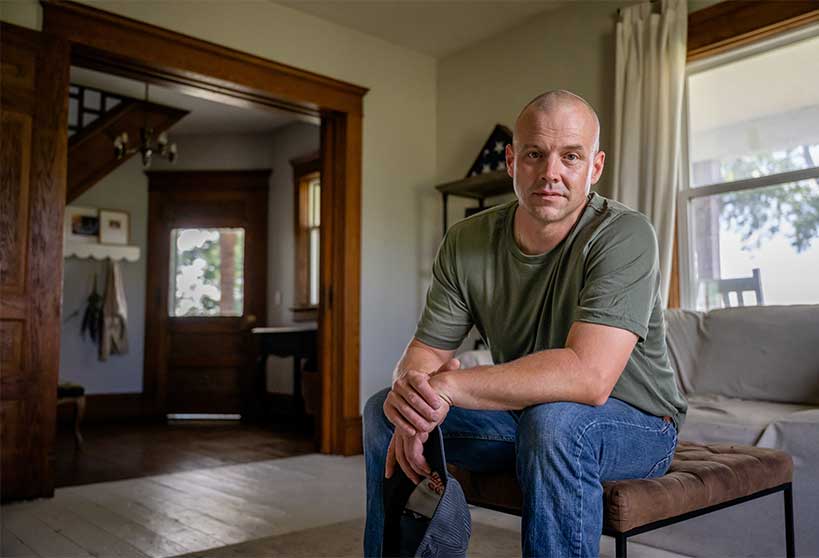Post-Traumatic Stress Disorder (PTSD) Treatment In Ohio

Medically Reviewed By: Manish Mishra, MBBS
Treatment options for post-traumatic stress disorder (PTSD) in Ohio include forms of psychotherapy, medication, and treatment for co-occurring disorders. At Ohio Recovery Center, we offer well-rounded care for those living with PTSD.

Post-traumatic stress disorder, or PTSD, causes recurring feelings of dread, panic, and intense fear. A past traumatic experience, such as sexual assault, natural disasters, violence, and other events, can cause PTSD.
PTSD can hurt your relationships and reduce your overall quality of life. Many people who suffer from PTSD may hesitate to seek treatment. If you, a family member, or a loved one suffer from PTSD, professional mental health treatment programs can help.
Post-Traumatic Stress Disorder Treatment At Ohio Recovery Center
Ohio Recovery Center offers primary mental health treatment services for you or your loved ones living with post-traumatic stress disorder. Our evidence-based treatment of PTSD may include psychotherapy, medication management, and coping skills development.
Post-Traumatic Stress Disorder
Post-traumatic stress disorder revolves around a victim’s traumatic experience. A victim of PTSD may be in a safe environment, but seemingly minor triggers can cause feelings of intense unease, dread, and panic.
PTSD can have multiple aspects aside from the re-experiencing of a traumatic event. A PTSD victim’s reaction to a traumatic event, their unwillingness to approach said event, and an inability to remember traumatic memories may all contribute to a severe PTSD problem.
Types Of PTSD
Post-traumatic stress disorder can be caused by traumatic events, including:
- combat experience
- abusive relationships
- natural disasters
- near-death experiences
If you constantly hear about traumatic events, you may also develop PTSD, even if you did not experience the trauma yourself.
Diagnosis
To receive a PTSD diagnosis from a mental health professional, you may need:
- a re-experiencing symptom (flashbacks or dreams related to the traumatic event)
- an avoidance symptom (refusing to engage with situations or people that can cause triggers)
- arousal and reactivity symptoms (sleep problems, trouble concentrating)
- cognition and memory symptoms (overall negative thoughts, difficulty remembering the traumatic event)
Symptoms of PTSD may also last for more than one month. The different aspects of PTSD can separate it from other types of trauma and anxiety disorders.
Signs & Symptoms
Signs that a family member or loved one may be suffering from PTSD include:
- mood swings
- isolating themselves from others
- symptoms of anxiety or depression
- memory problems
- constant fatigue or trouble concentrating
The signs and side effects of PTSD can vary between patients.
Risk Factors
If you experience a natural disaster, domestic abuse, or violence, you may be more likely to develop PTSD compared to those who do not. Combat veterans may be more likely to develop PTSD than civilians. Women can be twice as likely to develop PTSD in their lives than men.
Statistics
According to the U.S. Department of Veterans Affairs, about 6 percent of people will experience PTSD in their lives. Only half of all PTSD victims look for PTSD treatment options.
These numbers also apply to approximately 12 million Ohioans, where hundreds of thousands of residents may suffer from PTSD every year.
Treating Post-Traumatic Stress Disorder
Treating post-traumatic stress disorder can involve several types of treatment. Your physical and mental health problems may be addressed during an effective treatment program.
Medication
Various prescription drugs can reduce your PTSD symptoms while you enroll in other treatment options. Antidepressants, anti-anxiety medication, and antipsychotics may be prescribed to treat PTSD.
Psychotherapy
Psychotherapy, also known as talk therapy, can treat a wide variety of mental health conditions, including PTSD. Many forms of psychotherapy may involve one-on-one meetings with a psychiatrist. Various types of psychotherapy can help reduce PTSD symptoms, including:
- cognitive behavioral therapy or CBT (addressing negative emotions caused by a traumatic event)
- prolonged exposure therapy (confronting and coping with a traumatic event)
- trauma-focused cognitive behavioral therapy (CBT for children and adolescents)
- group therapy meetings
- eye movement desensitization and reprocessing for PTSD (changing your understanding of a traumatic event)
Any or all of these psychotherapies may be used in your PTSD treatment program.
Other Treatment Options
Other treatment options for post-traumatic stress disorder may include mindfulness exercises and attending support groups.
You may also suffer from co-occurring mental disorders alongside PTSD, such as anxiety or depression. Your treatment program can also address these health conditions when appropriate.
How To Find PTSD Treatment In Ohio
If you’re having a mental health crisis caused by PTSD in Ohio, you can call a national or local crisis helpline. These phone numbers can be found on national mental health care websites and your county’s mental health and addiction recovery board.
Reach Out To Local Treatment Providers
Long-term treatment for PTSD may involve contacting nearby treatment centers, such as Ohio Recovery Center in Van Wert. You can get free information on mental health treatment before enrolling in a program.
PCP Or Family Physician
Your primary care doctor can refer you to nearby mental health professionals and treatment programs. If you’re referring a loved one for treatment, you can talk to your family physician.
SAMHSA
The Substance Abuse and Mental Health Services Administration can host mental health resources such as information pamphlets, links to treatment providers, and other services on their website.
To learn about our mental health care options for PTSD, please contact us today.
- American Psychiatric Association — What is Posttraumatic Stress Disorder (PTSD)? https://www.psychiatry.org/patients-families/ptsd/what-is-ptsd
- National Alliance on Mental Illness — Posttraumatic Stress Disorder https://www.nami.org/About-Mental-Illness/Mental-Health-Conditions/Posttraumatic-Stress-Disorder
- National Institute of Mental Health — Post-Traumatic Stress Disorder https://www.nimh.nih.gov/health/topics/post-traumatic-stress-disorder-ptsd
- Substance Abuse and Mental Health Services Administration — Post-Traumatic Stress Disorder (PTSD) https://www.samhsa.gov/mental-health/post-traumatic-stress-disorder

